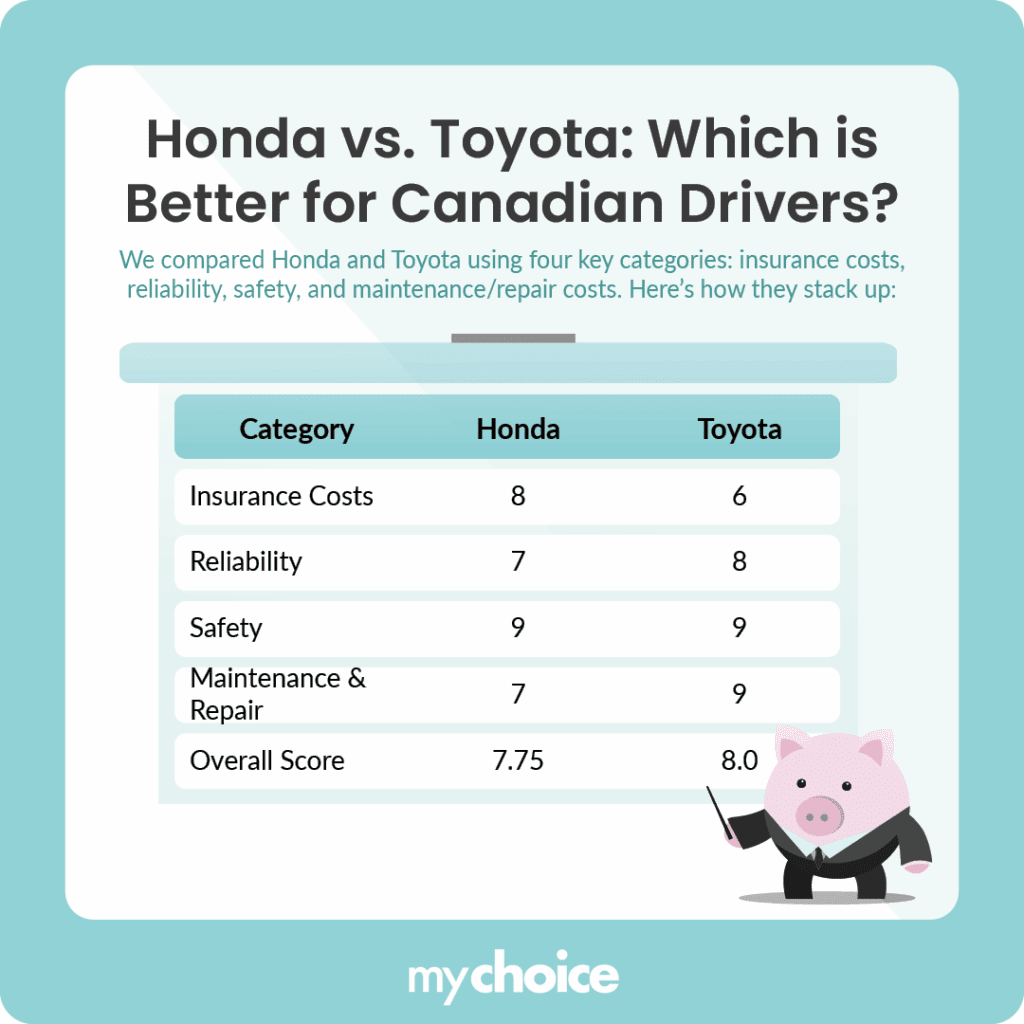Two Japanese car brands come to mind when you’re looking for a car that excels in reliability, everyday usability, and price: Toyota and Honda. These brands have been market leaders for decades and are trusted by drivers worldwide for their daily commutes.
Which Japanese car brand is better for Canadian drivers? What are the differences between Toyota and Honda? Which brand has the lowest car insurance premiums? Read on to find out which Japanese brand is better overall in Canada, and how much some of the most popular models cost to insure.
Honda vs Toyota: Which Car is Better for Canadian Drivers?
To help Canadian drivers choose between these two powerhouse car brands, we’ve come up with a scoring system based on four categories: car insurance costs, reliability, safety, and maintenance and repair costs. Using the latest industry data, here’s how Toyota and Honda compare against each other:
| Category | Honda | Toyota |
|---|---|---|
| Insurance Costs | 8 | 6 |
| Reliability | 7 | 8 |
| Safety | 9 | 9 |
| Maintenance and Repair | 7 | 9 |
| Overall Score | 7.75 | 8.0 |
Honda’s lower insurance premiums give it a head start, but Toyota’s slight reliability and maintenance advantages give it a little bit of an edge on the overall score. The overall difference between these two brands is negligible, so choosing which one you want to purchase depends on which factor matters more to you.

Which Is Cheaper To Insure?
Insurance is often a key consideration for many drivers when buying a car. Here’s how Honda and Toyota compare in terms of average insurance premiums, along with a look at the rates for a few of the most popular models:
| Model | Brand | Annual Premium |
|---|---|---|
| Honda average premiums | Honda | $1,181 |
| Toyota average premiums | Toyota | $1,355 |
| Honda Civic DX 4DR (2024) | Honda | $1,376 |
| Honda Ridgeline (2024) | Honda | $809 |
| Honda CR‑V (2025) | Honda | $2,851 |
| Toyota Corolla Sedan (2025) | Toyota | $1,624 |
| Toyota Camry (2025) | Toyota | $1,749 |
| Toyota RAV4 (2024) | Toyota | $1,096 |
According to our data, Honda drivers pay roughly $174 less per year on average than Toyota owners. The Civic DX model runs about $1,376 annually, typical for a compact sedan, while the Ridgeline pickup is a standout at just $809. Toyota’s RAV4, Canada’s top‑selling SUV, sits in the middle at $1,096.
Engine size, body style, and repair costs all factor into your annual insurance premiums. SUVs generally attract higher rates than sedans, and models with advanced safety tech can earn discounts, but that only partially offsets higher base rates on pricier vehicles.
Which Car Brand Is More Reliable?
Reliability impacts peace of mind and resale value, both very important factors for car owners. In Consumer Reports’ reliability rankings for 2025, Toyota scored 62 out of 100 points, placing it as the third most reliable car brand. Honda scored 59 points, putting it just under Toyota, in fourth place.
Model‑by‑model insight:
- The 2025 Honda CR‑V is forecast to exceed average new‑car reliability, reflecting its long track record of trouble‑free performance.
- The 2025 Honda Civic is predicted to perform at roughly the average level for new cars: solid, but not class‑leading.
- The 2025 Toyota Corolla is expected to outpace the average new car, thanks to Toyota’s well‑tuned powertrains and conservative design updates.
- The 2025 Toyota RAV4 similarly ranks above average, benefitting from Toyota’s refined SUV platform.
Which Car is Safer?
Safety testing offers objective crash‑protection metrics. Below is a comparison of top‑selling Canadian models from each brand, using both IIHS crashworthiness and NHTSA overall star ratings.
| Model | IIHS Crash Tests | IIHS Award | NHTSA Overall Rating |
|---|---|---|---|
| Honda Civic Hatchback (2025) | Good in all small overlap, moderate, and side tests | Top Safety Pick + | 5 Stars |
| Toyota Corolla Sedan (2025) | Good in all small overlap and side tests | None | 5 Stars |
| Honda CR‑V (2025) | Good in front overlap and side tests | Top Safety Pick | 5 Stars |
| Toyota RAV4 (2025) | Good in crash tests but failed new side‑impact criteria | None | 5 Stars |
Under IIHS’s updated 2025 criteria, no Toyota SUVs, including the RAV4, qualified for a Top Safety Pick designation despite “Good” crash ratings. Both Civic and Corolla achieve “Good” in every structural test. Honda’s hatchback gains the edge with its TSP+ award, while Toyota’s sedan matches on NHTSA stars but falls just shy of IIHS’s SUV awards.
Which Car Brand Is Cheaper To Maintain And Repair?
Long‑term ownership costs hinge on routine maintenance and unexpected repairs. Toyota owners spend approximately $4,900 over a decade on upkeep and repairs, while Honda drivers average about $5,850. This difference stems in part from Toyota’s longer service intervals on oil and fluid changes, as well as fewer scheduled timing‑belt replacements on key engines.
Beyond raw numbers, Toyota’s extensive dealer and aftermarket network across Canada keeps parts competitively priced and readily available. Popular Toyota models, such as the Corolla, Camry, and RAV4, benefit from economies of scale that drive down component costs. Honda’s lineup, while well‑engineered, sometimes demands pricier procedure-specific parts (for example, timing‑belt kits on the CR‑V and Pilot) and higher labour rates at brand‑specialist shops.
Key Advice from My Choice
- Choose compact models like the Honda Civic or the Toyota Corolla. Sedans typically cost 10-20% less to insure than SUVs.
- Many insurers offer discounts for factory driver-assist systems, dashcams, and other safety features that both Toyota and Honda offer on various models.
- Compare insurance quotes between multiple providers using MyChoice’s comparison tool to see which brand and models cost less to insure in your area.








